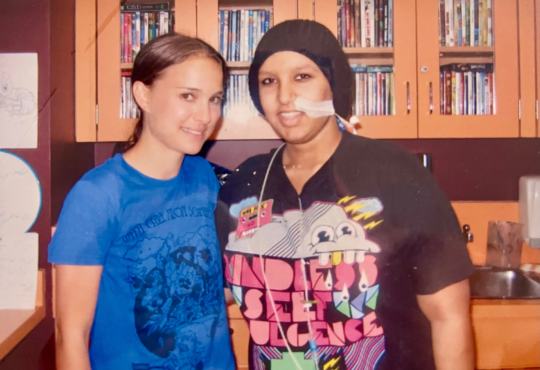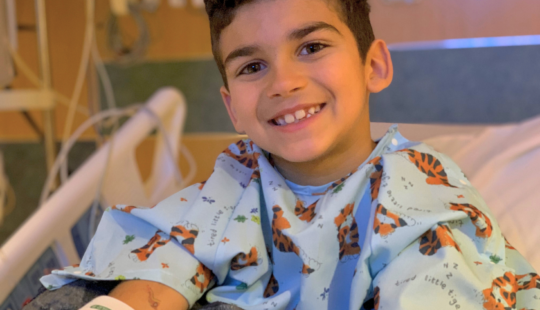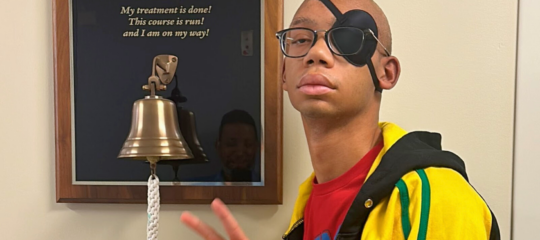
A Mother’s Intuition Leads to a Life-Saving Procedure

When six-year-old Nathaniel rushed into his mother Chelsea’s bedroom late at night on December 15, 2022, his behavior seemed strange. He said he felt sick but went into her closet rather than the bathroom. Thinking he was disoriented due to a bad dream, Chelsea guided Nathaniel to the bathroom, where he stood facing away from the toilet, ready to vomit in the wrong direction. “I had to turn him around,” Chelsea recalls. “And I noticed his pupils were unusually large.” Moments later, Nathaniel’s body stiffened, he trembled, and within minutes he fell into a deep, nearly coma-like sleep.
Initially, Chelsea didn’t realize this was a seizure. Although doctors ran tests, they attributed the episode to exhaustion. Nathaniel seemed fine afterward, and life returned to normal—until exactly one month later on a road trip from their home in Jacksonville to Orlando. This time, Nathaniel was in the backseat when Chelsea heard strange sounds. She pulled over and watched as the same symptoms repeated—dilated pupils, vomiting, tremors, and a deep sleep. This time, Chelsea recorded the episode on her phone, feeling certain it was something serious. “The first time, doctors wrote it off as exhaustion,” she says. “But I’d done some research, and all of Nathaniel’s symptoms pointed to seizures.”
Following examination at the closest hospital emergency room, Chelsea felt doctors were about to dismiss her as an over-reactive parent until she showed them the recording. Then the response was immediate. The doctors ordered a CAT scan, which revealed distressing news: Nathaniel had a quarter-sized tumor in his occipital lobe. He was airlifted to another, larger hospital, nearby, where a biopsy revealed the tumor was an astrocytoma. Yet, even with the diagnosis, there were complexities—Nathaniel’s tumor was fused with an exceptionally rare gene, making his case unique and the path forward uncertain.
Initially, doctors recommended laser ablation, a new and minimally invasive surgery, to remove the tumor. But after learning the procedure would require remote guidance, Chelsea sought a second opinion at Duke Children’s Hospital in Durham. There, the team advised closely monitoring the tumor, as astrocytomas are slow-growing and often stop growing all together.
But at a follow-up appointment in June, scans showed the tumor had begun growing toward Nathaniel’s spinal ventricles, creating a life-threatening risk of blood clots. “That’s when we went from thinking it was manageable to knowing we had to take action,” Chelsea explains. Although chemotherapy and radiation were options, Chelsea hesitated due to the potential long-term side effects. Duke’s team suggested a targeted oral drug therapy, which could pinpoint abnormal cells without damaging healthy tissue, but it carried a risk of cardiac side effects.
As Chelsea weighed the options, a Duke pediatric neurosurgeon reviewed Nathaniel’s scans and proposed a full resection of the tumor. “It felt right,” Chelsea shares. “I trusted my intuition that this was the path we should pursue.” Still, their struggles weren’t over because insurance denied the procedure. But Duke’s team quickly appealed and a week later Chelsea received the call she’d been hoping for: the surgery was approved.
On August 10, 2023, Nathaniel underwent resection surgery, and the neurosurgeon successfully removed the entire tumor. When he awoke, Nathaniel surprised everyone by standing within an hour and passing an eye exam with 20/20 vision, an unexpected result given the brain swelling that can impact both post-surgery. “The doctor was amazed,” Chelsea recalls.
Chelsea and Nathaniel stayed at the Ronald McDonald House during Nathaniel’s hospital stay, and their social worker gathered money from a variety of organizations to provide a temporary apartment for the remainer of the month until his post-op appointment. “Everyone at Duke Childrens was incredible,” Chelsea reflects, “but our social worker was absolutely amazing! They all made everything so much easier for us, from resources I wasn’t aware of, to gas cards, to help in finding and paying for housing after discharge.”
Today, Nathaniel is eight years old, back at school, and enjoying all the activities he loves—trips to the zoo, ice cream outings, and adventures at trampoline parks. For Chelsea, the journey has been transformational. Encouraged by her sister, who is a nurse, she decided to enter nursing school, inspired by the care and support she saw firsthand during Nathaniel’s treatment. “Support is so important,” she emphasizes. “It takes a village, not only to raise a child, but to support your child—and you—when you’re going through something like this.”
Reflecting on the months of uncertainty and the support of Duke Children’s medical team, Chelsea shares how much the experience has shaped her perspective. “It’s not just about the doctors or the treatment; it’s also about the people who make sure you don’t feel alone,” she explains. “When I call with a concern, I know they’re there. It’s a huge comfort.”
Support is vital for families navigating a pediatric brain tumor diagnosis, and the Pediatric Brain Tumor Foundation offers resources for every phase, from diagnosis to recovery. For emotional, financial, or medical guidance, visit curethekids.org or contact our Patient Family Advocacy team at [email protected]. No family should face the journey alone.
Related Stories


Patrick’s Recovery Through Laughter, Learning, and Sheer Determination

A Circle of Support: The Kaczmarski Family’s Journey from Receiving to Giving Back
Related Updates
The Pediatric Brain Tumor Foundation welcomes Day One Biopharmaceuticals’ renowned Dr. Samuel C. Blackman to its Board of Directors
Pediatric Brain Tumor Foundation Statement on the Reported NIH Grant Review Pause

